Download
Roundup – September 2011/1
Brian
Wilson
The August/2 Roundup is here
and earlier editions can be found here.
I’m sorry to see that passionato.com no longer offer the
EMI Classics and Virgin catalogues, to add to the number of
labels which they have lost recently. As they were the only
download site to offer much of what they had in lossless flac
as well as mp3, apart from the own-label sites and until eclassical.com
started offering 16- and sometimes 24-bit flac, you’ll
find plenty of passionato.com links which no longer work in
earlier reviews. Win some, lose some, however: classicsonline.com
are now offering music from these two catalogues – around
400 titles as I write, with more being added. They need to sort
out their pricing policy – certain recordings which are
identically priced on CD come at widely varying prices as downloads
– some budget-price Encore discs at a very reasonable
£3.99, others over-priced at £8.99. Usually the
downloads cost significantly less than the equivalent CD(s)
but sometimes considerably more – but that will, doubtless,
be sorted out in due course.
A similar problem seems to afflict the new download service
from arkivmusic.eu, with single full-price CDs hugely uncompetitive
at €20.99/£15.99 – even ‘special offers’
at €10.99/£7.99 are not attractive – yet some
of the latest Helios CDs reviewed below significantly undercut
Hyperion’s own price as special offers at €4.99/£3.24.
Recording
of the Month
Francesco CAVALLI (1602-1676)
Artemisia (Venice, 1657)
Francesca Lombardi Mazzulli (soprano) – Artemisia
Roberta Mameli (soprano) – Artemia
Valentina Coladonato (soprano) – Oronta
Maarten Engeltjes (counter-tenor) – Meraspe
Andrea Arrivabene (counter-tenor) – Alindo
Marina Bartoli (soprano) – Ramiro
Silvia Frigato (soprano) – Eurillo
Salvo Vitale – Indamoro
Alberto Allegrezza – Erisbe
Alessandro Giangrande (counter-tenor) – Niso
La Venexiana/Claudio Cavina – rec. Mondovì, Italy,
October 2010. DDD
Booklet with libretto and translations
GLOSSA GCD920918 [3 CDs: 2:25:40] – from eclassical.com
(mp3 and lossless)
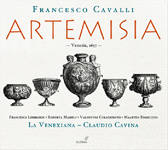 The
plot of Artemisia is hugely complicated – even
the Wikipedia article doesn’t try to summarise it –
and if you download from classicsonline.com or emusic.com it’s
made even more so by the lack of a booklet of notes, libretto
and translation, which makes the 3-CD set more appealing. Nor
will you save much over the price of the CDs from these sources.
The
plot of Artemisia is hugely complicated – even
the Wikipedia article doesn’t try to summarise it –
and if you download from classicsonline.com or emusic.com it’s
made even more so by the lack of a booklet of notes, libretto
and translation, which makes the 3-CD set more appealing. Nor
will you save much over the price of the CDs from these sources.
Eclassical.com rides to the rescue, with mp3 and 16-bit
flac at the same low price of $17.48, a considerable saving
on the CDs and rival downloads, potentially better sound quality
if you choose the flac – come back later for the mp3 for
your iPod if you wish – and mirabile dictu the
libretto, translation and notes in an attractive 130-page booklet.
Once again, then, an eclassical.com download tops the bill.
I can’t resist making this Download of the Month
because the music is so attractive, the performances and recording
are so sympathetic and the eclassical.com download comes complete
with all the goods. I wouldn’t recommend Artemisia
before the two better known Cavalli operas La Calisto
and l’Ormindo, but I prefer it to Ercole Amante,
a performance of which I reviewed
on DVD some time ago (Opus Arte OA1020D), perhaps because
I was a little put off by tomfoolery with fat suits and the
like in that production.
Squeezebox seemed irreconcilably opposed to completing the flac
version of the final track of Act II (track 215) before leaping
onto Act III, so your best bet may be to play the download via
Winamp – the free version will do – or to burn the
recording to three CDs via some such programme as Winamp. Alternatively,
the mp3 version of this track plays without problem in Squeezebox
and is easily substituted for the flac version.
Reissue
of the Month
Sir Edward ELGAR (1857-1934)
Symphony No. 1 in A flat Op.55 (1908) [48:37]
Symphony No. 2 in E flat Op. 63 (1911) [51:16]
London Philharmonic Orchestra/Sir Adrian Boult – rec.
1968. ADD
LYRITA SRCD.221 [48:37 + 51:16] – from emusic.com
(mp3)
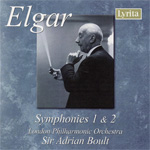 [see
reviews by Rob
Barnett: ‘Perhaps not the most passionately headstrong
of readings but full of the satisfaction of maturity and not
short of carefully managed excitement. Should be in the collection
of all Elgarians’, Jonathan
Woolf: ‘not essential but very valuable’, and
Stephen
Hall: ‘WOW isn’t a word used in classical music
reviewing but this Lyrita re-issue deserves it and I use it
because I’m of an age to have the original 1968 vinyls,
so there!’]
[see
reviews by Rob
Barnett: ‘Perhaps not the most passionately headstrong
of readings but full of the satisfaction of maturity and not
short of carefully managed excitement. Should be in the collection
of all Elgarians’, Jonathan
Woolf: ‘not essential but very valuable’, and
Stephen
Hall: ‘WOW isn’t a word used in classical music
reviewing but this Lyrita re-issue deserves it and I use it
because I’m of an age to have the original 1968 vinyls,
so there!’]
I remember being disappointed by the original release of these
recordings in a gatefold 2-LP set, mainly because of the decision
to group the violins together on the left instead of divided
left and right. Rightly or, as it proves, wrongly, I resisted
the CD reissue. That decision regarding the non-divisi
violins remains a disappointment but whatever other reservations
I had forty-plus years ago – mainly, I think, that slight
lack of drive to which Rob Barnett refers – have fallen
away. Perhaps as a septuagenarian I now better appreciate Boult’s
Indian summer recordings. They now (just) replace for me the
two Hickox recordings for Chandos which I recommended in the
January
2010 Roundup.
The CDs are available from Musicweb International for just £11.75
– here
– two discs for the price of one and worth having in that
form for the notes alone. The eMusic download is a decent substitute
and the sound is more than acceptable, even though it’s
delivered at slightly below the 192 kb/s bit-rate usually regarded
as the minimum for mp3 or DAB. At £3.36 or less, I’m
not surprised that this is their most downloaded Lyrita recording.
Amazon.co.uk have these recordings to download but their price
is only fractionally less than the cost of the CDs. Their download
of Boult’s EMI recordings of these symphonies, with ample
fillers, is better value for £5.49. Their offering of
the Andrew Davis recordings of the symphonies and other Elgar
works is also well worth considering: 5 CDs for just £10.49.
Bargain
of the Month
Arvo PÄRT (b.1935) Passio
(Passio Domini Nostri Jesu Christi Secundum Ioannem,
The Passion of our Lord Jesus Christ according to John, 1982)
The Hilliard Ensemble (David James (counter-tenor); Rogers Covey-Crump,
John Potter (tenor); Gordon Jones (baritone); Lynne Dawson (soprano);
Michael George (bass); Elizabeth Layton (violin); Melinda Maxwell
(oboe); Elisabeth Wilson (cello); Catherine Duckett (bassoon);
Christopher Bowers-Broadbent (organ))
Western Wind Chamber Choir/Paul Hillier – rec. March 1988.
DDD
No texts.
ECM New Series 1370 [70:52] – from emusic.com
(mp3)
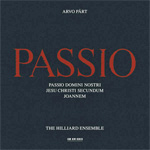 Apart
from a musically illiterate attribution of the performance to
Catherine Duckett alone in the emusic heading, this has to be
a strong recommendation, not least because this hauntingly beautiful
music comes complete on one track for a mere £0.48 or
less. (£5.49 from iTunes.) The one-track arrangement,
though it prevents easy finding of individual parts of the work,
which is normally presented in four sections, also avoids any
possible gaps in the music, as sometimes happens with mp3.
Apart
from a musically illiterate attribution of the performance to
Catherine Duckett alone in the emusic heading, this has to be
a strong recommendation, not least because this hauntingly beautiful
music comes complete on one track for a mere £0.48 or
less. (£5.49 from iTunes.) The one-track arrangement,
though it prevents easy finding of individual parts of the work,
which is normally presented in four sections, also avoids any
possible gaps in the music, as sometimes happens with mp3.
Most reviewers have marginally preferred the later Naxos recording
under Anthony Pitts (8.555860), but there are also points in
favour of this pared-down Hilliard version; indeed, John Quinn
marginally preferred the Hilliards – see his review
of the Naxos recording.
There are no texts, but chapters 18 and 19, 1-30 of St John’s
Gospel in the Latin Vulgate are readily available online. You
may find marginal variations between the text which Pärt
sets (from the Tridentine liturgy and the Sixtine-Clementine
Vulgate) and more recent editions which rely on the earliest
manuscripts and are, thus, closer to St Jerome’s original.
After John 19.30 Pärt concludes with the words: Qui
passus es pro nobis miserere nobis. Amen. [You who suffered
for us, have mercy upon us. Amen.]
Discovery
of the Month
William Brocklesby WORDSWORTH
(1908-1988)
Symphony No. 2 in D, Op.34 (1947/8) [43:45]
Symphony No. 3 in C, Op.48 (1948) [27:20].
London Philharmonic Orchestra/Nicholas Braithwaite. –
rec. January 1988. DDD
LYRITA RECORDED EDITION SRCD.207 [71:05] – from
emusic.com
(mp3)
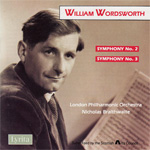 [see
review
by Colin Clarke: Recording of the Month.]
[see
review
by Colin Clarke: Recording of the Month.]
I must have come across the music of William Wordsworth before;
if so, I’ve put it to the back of my mind, so this recording
was a real discovery. The music and performances are all that
CC says and the recording is good. Despite very low bit-rates
(177-185 kb/s, when 192 kb/s has come to be regarded as the
minimum for classical music), the mp3 transfer does justice
to the music. Even if you’ve never heard a note of Wordsworth’s
music, this is well worth trying for £2.94 or less. Non-members
can obtain the download from amazon.co.uk for £7.49.
Beulah
Extra
The picks of this month’s Beulah reissues are:
Wolfgang Amadeus MOZART (1756-1791)
Symphony No. 32 in G, K318
Berlin Philharmonic Orchestra/Karl Böhm – rec.1960.
ADD/stereo
BEULAH 5BX133 [8:37] – from eavb.co.uk
(mp3)
Symphony No. 35 in D, K385 (‘Haffner’)
Berlin Philharmonic Orchestra/Karl Böhm – rec.1960.
ADD/stereo
BEULAH 1-4BX133 [17:40] – from eavb.co.uk
(mp3)
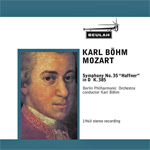 This
is old-school Mozart of the very best kind – a fairly
large orchestra, but playing with all the athleticism of a smaller
ensemble and still very well worth hearing. Like Bruno Walter,
whose stereo recordings of Nos. 35-41 I still treasure, Böhm
brings out all the aristocratic elegance of the ‘Haffner’
without losing sight of the livelier aspects of the work. His
version of the one-movement No.32 makes an excellent case for
this earlier symphony, too. I only wish that he had observed
more repeats in the ‘Haffner’ – 18 minutes of
this kind of performance is just too short, so I played the
whole symphony again. The recording has come up as fresh as
paint in both works. This is an excellent and inexpensive alternative
to the DGG Originals 2-CD reissue of Böhm’s recordings
of Nos. 35-41.
This
is old-school Mozart of the very best kind – a fairly
large orchestra, but playing with all the athleticism of a smaller
ensemble and still very well worth hearing. Like Bruno Walter,
whose stereo recordings of Nos. 35-41 I still treasure, Böhm
brings out all the aristocratic elegance of the ‘Haffner’
without losing sight of the livelier aspects of the work. His
version of the one-movement No.32 makes an excellent case for
this earlier symphony, too. I only wish that he had observed
more repeats in the ‘Haffner’ – 18 minutes of
this kind of performance is just too short, so I played the
whole symphony again. The recording has come up as fresh as
paint in both works. This is an excellent and inexpensive alternative
to the DGG Originals 2-CD reissue of Böhm’s recordings
of Nos. 35-41.
Look out next month for Böhm’s 1955 recording of Beethoven’s
Symphony No.8 with the Vienna Philharmonic (6-9BX133).
Franz SCHUBERT (1797-1828)
Symphony No.9 in C (‘Great’ C Major)
Concertgebouw Orchestra, Amsterdam/Josef Krips – rec.
1952. ADD/mono
BEULAH EXTRA 2-5BX46 [47:55] – from eavb.co.uk
(mp3)
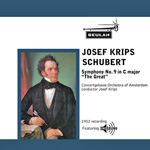 For
many years this was ‘the’ version of the Great C Major;
even when Krips re-recorded the work in stereo it continued
to do sterling service on the Ace of Clubs label and it’s
still well worth hearing now. The only reservation concerns
the availability, also from Beulah Extra, of Boult’s 1934
recording on 20-23BX12 (see October
2010 Roundup). Of course, the Krips comes in much better
sound – remarkably good for its age; in a blindfold test
I’d have placed it a few years later than 1952 and even
the mono sound is no handicap to enjoyment. It certainly sounds
much better than I recall the Ace of Clubs LP and it comes for
just £3 – if you want just this work, that’s
less expensive than the reissue of the same performance on Australian
Eloquence 480 2802, coupled with Beethoven.
For
many years this was ‘the’ version of the Great C Major;
even when Krips re-recorded the work in stereo it continued
to do sterling service on the Ace of Clubs label and it’s
still well worth hearing now. The only reservation concerns
the availability, also from Beulah Extra, of Boult’s 1934
recording on 20-23BX12 (see October
2010 Roundup). Of course, the Krips comes in much better
sound – remarkably good for its age; in a blindfold test
I’d have placed it a few years later than 1952 and even
the mono sound is no handicap to enjoyment. It certainly sounds
much better than I recall the Ace of Clubs LP and it comes for
just £3 – if you want just this work, that’s
less expensive than the reissue of the same performance on Australian
Eloquence 480 2802, coupled with Beethoven.
In 1952 the lack of repeats was regarded as a merit; now that
we are more used to the ‘heavenly length’ of the work,
it seems to be more of a defect, but it’s the only one
and you may prefer it that way. I’ve certainly no complaints
about the fairly brisk pace for the slow movement. Perhaps we
might now also have Krips’ stereo remake with the LSO (SXL2045)
for those who don’t want the Unfinished coupling
on the Eloquence reissue of that – I never got round to
hearing it, since I plumped for Böhm instead when it came
to choosing a stereo version.
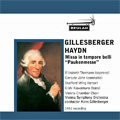 Other
releases include a recording of HAYDN’s
Mass in Time of War (Missa in tempore belli or Paukenmesse,
H22/9) with Hans Gillesberger at the helm on 1-6BX134 [41:01
- here].
The soloists are variable and the Vienna Chamber Choir and Vienna
Symphony Orchestra are never much more than adequate, but Gillesberger’s
lively direction saves the day and the Vox recording (c.1960?*)
has come up well. At 17/6 (88p) this was an excellent bargain
when it was reissued on the Turnabout label in 1967, and the
Beulah release remains very good value – less than half
the modern equivalent of 17/6.
Other
releases include a recording of HAYDN’s
Mass in Time of War (Missa in tempore belli or Paukenmesse,
H22/9) with Hans Gillesberger at the helm on 1-6BX134 [41:01
- here].
The soloists are variable and the Vienna Chamber Choir and Vienna
Symphony Orchestra are never much more than adequate, but Gillesberger’s
lively direction saves the day and the Vox recording (c.1960?*)
has come up well. At 17/6 (88p) this was an excellent bargain
when it was reissued on the Turnabout label in 1967, and the
Beulah release remains very good value – less than half
the modern equivalent of 17/6.
The transfer is thin, but generally free from distortion. Nevertheless,
for regular listening I’d prefer a more recent recording
– John Eliot Gardiner (Philips
470 8192 – download separately or as part of a
set, 475
1012, both from passionato.com: see June
2009 Roundup) or Richard Hickox (Chandos, CHAN0633
– from theclassicalshop.net – or complete set on
CD, CHAN0734), for example: see March
2009 Roundup for the Hickox, but note that the complete
set seems no longer to be available to download, so you need
to go for the separate album or buy the USB set of all the Masses
plus six of the London Symphonies, the equivalent of 10 CDs
for £49.99 and excellent value: look out for a detailed
review in the near future. (CHUSB0015).
To listen to either of the newer versions is to enter a different
sound world.
* Beulah’s date of 1950 seems unduly early for a recording
first issued in mono and stereo in 1962, yet I don’t hear
any stereo information in the transfer, so maybe the Turnabout
was bogus ‘electronic stereo’.
OFFENBACH’s Overture
to Orpheus in the Underworld (1BX143 [7:43] –
here)
is taken from the lively and enjoyable 1960 Sadler’s Wells
recording of excerpts, conducted by Alexander Faris, which I
recommended from Past Classics in my March
2011/1 Roundup. Past Classics give us the Overture for just
£0.42 and the contents of the whole original LP for £0.84
in a decent transfer, but Beulah take more care over their transfers
and the sound of the result is fuller and preferable. I note
that the two transfers are at slightly different pitch and I’ll
put my shirt on Beulah being right. Many, like me, will remember
the sheer fun of that production so, please, may we now have
the complete recording from Beulah?
There are two short contributions from the Paris Conservatoire
Orchestra conducted by Charles Munch in 1946: Gabriel
FAURÉ Pavane, Op.50 [4:48] on 16BX32
and Albert ROUSSEL Petite
Suite, Op.39 on 15BX32 [12:02]. The Fauré
receives an evocative performance, decently recorded for its
age and free from surface noise. The Roussel is less well known
and less immediately appealing, and there are not many rival
recordings, but it, too, receives an idiomatic performance and
good recording for its date. Find both recordings here.
As a pendant to the recordings of Peter Dawson on Beulah Extra
and the two albums which are available from iTunes, featured
in the July 2011/1 and August 2011/1 Roundups, this month we
have his 1926 recording of Hubert PARRY’s
Jerusalem on 17BX53 [2:15]. Though
it’s also included on the album Peter Dawson Man of
Song (2PD53 – find it here),
many will appreciate its separate availability. As usual with
78s, the voice comes across much better than the orchestral
accompaniment; with Beulah’s usual skilful refurbishment,
this gives us later-comers a decent idea of the quality of Dawson’s
voice – and his wonderful diction, which sounds so attractively
old-fashioned now, the musical equivalent of Alvar Liddell reading
the 9 o’clock news or Bob Danvers Walker on Pathé
newsreel.
There’s more music by PARRY
on 2BX1, I was glad when they said unto me from
the 1933 Festival of English Church Music [7:20]. The recording
is not at all bad for its age and it’s been well spruced
up by Beulah. Find both Parry recordings here.
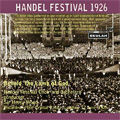 Finally
HANDEL’s Behold
the Lamb of God from the 1926 Handel Festival on 3BX1
[3:37] – here.
In place of the Beulah house-style cover, there’s a photograph
of the massed forces of performers at the Crystal Palace, together
with a quotation from Gramophone magazine. We’re not so
fond of a ‘gigantic combination of sounds’ in Handel
these days and the recording requires a good deal of tolerance,
but this reissue enshrines a valuable historic record. The miracle
is that it was recorded at all and placed on the market within
months.
Finally
HANDEL’s Behold
the Lamb of God from the 1926 Handel Festival on 3BX1
[3:37] – here.
In place of the Beulah house-style cover, there’s a photograph
of the massed forces of performers at the Crystal Palace, together
with a quotation from Gramophone magazine. We’re not so
fond of a ‘gigantic combination of sounds’ in Handel
these days and the recording requires a good deal of tolerance,
but this reissue enshrines a valuable historic record. The miracle
is that it was recorded at all and placed on the market within
months.
I haven’t yet had time to listen to Beulah’s refurbishment
of the 1947 Huddersfield Choral Society recording of Mendelssohn’s
Elijah, conducted by Sir Malcolm Sargent, but I’m
very much looking forward to it. It’s released on iTunes
in September and on two tracks from Beulah Extra in October
(22-23BX13).
Hyperion
reissues
September brings a particularly rich crop of reissues on Hyperion’s
budget-price Helios label, all available in mp3, flac or alac
format for the same price of £5.99. In chronological order:
A Song for Francesca: Music in Italy, 1330-1430
Andreas De FLORENTIA Astio
non morì mai – ballata [3:02]; Per la ver’onestà
– ballata [4:35]
ANONYMOUS Quando i oselli canta – madrígal
[2:01]; (Faenza codex) Constantia [3:04]
Giovanni Da CASCIA ‘Johannes De
FLORENTIA’ Quando la stella – madrígal
[3:15]
ANONYMOUS Amor mi fa cantar a la Francesca –
ballata [2:34]; (Faenza codex) Non na el so amante
[2:39]
Francesco LANDINI Ochi
dolenti mie – ballata [2:52]; Per seguir la sperança
– ballata [3:38]
ANONYMOUS O regina seculi / Reparatrix Maria [2:28]
Guillaume DUFAY Quel
fronte signorille in paradiso [2:36]
Richard LOQUEVILLE Puisque
je suy amoureux – rondeau [2:52]; Pour mesdisans
ne pour leur faulx parler [1:52]
Hugo de LANTINS Plaindre
m’estuet – rondeau [4:33]
Johannnes HAUCOURT Je
demande ma bienvenue – rondeau [1:52]
ANONYMOUS Confort d’amours – rondeau
[3:47]
Richard LOQUEVILLE Qui
ne veroit que vos deulx yeulx – rondeau [1:12]
Estienne GROSSIN Va t’ent
souspir [1:34]
Gothic Voices with Andrew Lawrence-King medieval harp/Christopher
Page – rec. September 1987. DDD.
Pdf booklet with notes, texts and translations included
HYPERION HELIOS CDH55291 [50:29] – from hyperion-records.co.uk
(mp3 and lossless)
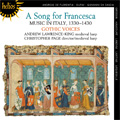 Any
recording by Gothic Voices is self-recommending. It’s very
good to see this joining most of the rest of their Hyperion
recordings at budget price, having been available till recently
only as part of a 3-CD set. Only those predisposed to dislike
this early-renaissance repertoire, or to its being sung without
instrumental accompaniment should steer clear – as usual,
Christopher Page employs Andrew Lawrence-King on medieval harp
for instrumental interludes only. With excellent recording,
de luxe notes and texts, this could easily have been
my Reissue of the Month. Try Haucourt’s Je demande ma
bienvenue and you’ll be sold.
Any
recording by Gothic Voices is self-recommending. It’s very
good to see this joining most of the rest of their Hyperion
recordings at budget price, having been available till recently
only as part of a 3-CD set. Only those predisposed to dislike
this early-renaissance repertoire, or to its being sung without
instrumental accompaniment should steer clear – as usual,
Christopher Page employs Andrew Lawrence-King on medieval harp
for instrumental interludes only. With excellent recording,
de luxe notes and texts, this could easily have been
my Reissue of the Month. Try Haucourt’s Je demande ma
bienvenue and you’ll be sold.
Tomás Luis de VICTORIA
(1548-1611)
Veni Sancte Spiritus 8vv [3:07]
Dum complerentur 5vv [6:54]
Missa Dum complerentur 6/7vv [29:23]
Popule meus 4vv [4:59]
Vexilla regis 4/6vv [8:33]
Veni Creator Spiritus 4vv [6:10]
Pange lingua gloriosi 4vv [6:26]
Lauda Sion salvatorem 8vv [3:21]
The Choir of Westminster Cathedral/James O’Donnell –
rec. March 1996. DDD
Pdf booklet with notes, texts and translations included
HYPERION HELIOS CDH55452 [68:27] – from hyperion-records-co.uk
(mp3 and lossless)
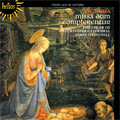 As
with Gothic Voices in the late-medieval and early-renaissance
repertoire (above) and the King’s Consort in the baroque
(below), Westminster Cathedral’s recordings of Victoria,
especially under David Hill and James O’Donnell are benchmarks
and this, their latest reissue in Victoria’s quatercentenary
year, is no exception. I’ve already recommended their recording
of the Missa Vidi speciosam, etc., under David Hill,
also reissued this month on CDH55358
(see June
2011/1 Roundup) and the Missa Trahe me (CDH55376
– see March
2011/2 Roundup); the O’Donnell recording is equally
excellent. The music relates mainly to the feast of Pentecost
(Whitsun) but some of the shorter works are for Holy Week and
it might have been more logical to have placed these first.
There’s a good rival recording of the Motet and Mass Dum
complerentur on Nimbus NI5434 (see August
2009 Roundup), but the Westminster Choir have the music
of Victoria rather more in their blood than Christ Church Cathedral
Choir under Stephen Darlington.
As
with Gothic Voices in the late-medieval and early-renaissance
repertoire (above) and the King’s Consort in the baroque
(below), Westminster Cathedral’s recordings of Victoria,
especially under David Hill and James O’Donnell are benchmarks
and this, their latest reissue in Victoria’s quatercentenary
year, is no exception. I’ve already recommended their recording
of the Missa Vidi speciosam, etc., under David Hill,
also reissued this month on CDH55358
(see June
2011/1 Roundup) and the Missa Trahe me (CDH55376
– see March
2011/2 Roundup); the O’Donnell recording is equally
excellent. The music relates mainly to the feast of Pentecost
(Whitsun) but some of the shorter works are for Holy Week and
it might have been more logical to have placed these first.
There’s a good rival recording of the Motet and Mass Dum
complerentur on Nimbus NI5434 (see August
2009 Roundup), but the Westminster Choir have the music
of Victoria rather more in their blood than Christ Church Cathedral
Choir under Stephen Darlington.
Sebastian KNÜPFER (1633-1676)
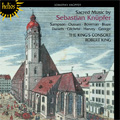 Vom
Himmel hoch, da komm ich her [11:32]
Vom
Himmel hoch, da komm ich her [11:32]
Was mein Gott will, das gescheh allzeit [11:41]
Wenn mein Stündlein vorhanden ist [8:14]
Ach Herr, strafe mich nicht in deinem Zorn [12:16]
Quemadmodum desiderat cervus [5:10]
Super flumina Babylonis [9:18]
Jesus Christus, unser Heiland [10:38]
Die Turteltaube lässt sich hören [10:35]
Carolyn Sampson, Rebecca Outram, Susan Hamilton (soprano)
James Bowman, Robin Blaze (counter-tenor)
James Gilchrist, Charles Daniels (tenor)
Peter Harvey, Michael George, Robert Evans (bass)
The King’s Consort/Robert King – rec. September 1999.
DDD.
Pdf booklet with notes, texts and translations included
HYPERION HELIOS CDH55393 [78:27] – from hyperion-records.co.uk
(mp3 and lossless)
Johann SCHELLE (1648-1701)
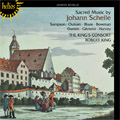 Lobe
den Herrn, meine Seele [10:53]
Lobe
den Herrn, meine Seele [10:53]
Wohl dem, der den Herren fürchtet [7:41]
Aus der Tiefen [10:15]
Herr, lehre uns bedenken [9:36]
Gott, sende dein Licht [10:59]
Komm, Jesu, komm [5:42]
Christus, der ist mein Leben [9:28]
Christus ist des Gesetzes Ende [4:47]
Vom Himmel kam der Engel Schar [8:31]
Carolyn Sampson, Rebecca Outram, Lisa Beckley, Julie Cooper
(soprano)
James Bowman, Robin Blaze (countertenor)
Charles Daniels, James Gilchrist, Angus Smith, Matthew Vine
(tenor)
Peter Harvey, Charles Pott (bass)
The King’s Consort/Robert King – rec. November 2000.
DDD.
Pdf booklet with notes, texts and translations included
HYPERION HELIOS CDH55373 [78:54] – from hyperion-records.co.uk
(mp3 and lossless)
I wouldn’t exactly call these two composers ‘Bach-a-likes’
as Hyperion do in their publicity material – much of the
music harks back to Schütz as much as forward to Buxtehude
and Bach – but these are two extremely valuable reissues
of music by important but little-known predecessors of Johann
Sebastian. As with Gothic Singers, anything by the King’s
Consort attracts my immediate attention.
Gerald Fenech awarded a well-deserved 5+5-star rating to the
Knüpfer on its first appearance – see review
– and I see no reason to demur. The Schelle recording,
with a slightly different line-up of singers, is equally distinguished.
Both albums come with the usual de luxe booklet, a straight
reprint of the full-price original apart from the Helios logo
on the covers, themselves attractive additions to the appeal
of these reissues.
A recording of the music of another of Bach’s predecessors
at the Thomaskirche, Johann Kunhnau, also made for this
series by the King’s Consort, languishes in Hyperion’s
Archive series, though it’s readily available for download:
CDA67059.
I look forward to its reissue, too, on the Helios label, as
foreshadowed in the booklets for the two current reissues. Ditto
the Sacred Music of Jan Dismas Zelenka on CDA67350.
If you can’t wait in order to save £2, these are
both well worth the outlay of £7.99.
Anton BRUCKNER (1824-1896)
Mass No.3 in f minor [59:44]
Psalm 150 [8:16]
Juliet Booth (soprano); Jean Rigby (contralto); John Mark Ainsley
(tenor); Gwynne Howell (bass)
Corydon Singers; Corydon Orchestra/Matthew Best – rec.
1992. DDD.
HYPERION HELIOS CDH55332 [68:01] – from hyperion-records.co.uk
(mp3 and lossless)
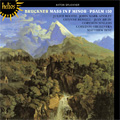 Just
two things prevent me from giving this the very highest accolade:
the Corydon Singers and Matthew Best perform all three Masses
and other pieces on a 3-CD set which works out even less expensively
per disc (CDS44071/3
£14.99 in all download formats) and there are equally
fine performances of all three Masses from the Bavarian Radio
Chorus and Orchestra under Eugen Jochum on DG Originals (447
4092, £9.49 in mp3, £11.49 in flac from the
DG shop here),
also Te Deum and Psalm 150 from Berlin forces and Jochum
on 457 7432 – download in mp3 or lossless from
passionato.com – here
– or stream Jochum’s Psalm 150, a slightly more measured
account than Best’s, from Spotify.
Just
two things prevent me from giving this the very highest accolade:
the Corydon Singers and Matthew Best perform all three Masses
and other pieces on a 3-CD set which works out even less expensively
per disc (CDS44071/3
£14.99 in all download formats) and there are equally
fine performances of all three Masses from the Bavarian Radio
Chorus and Orchestra under Eugen Jochum on DG Originals (447
4092, £9.49 in mp3, £11.49 in flac from the
DG shop here),
also Te Deum and Psalm 150 from Berlin forces and Jochum
on 457 7432 – download in mp3 or lossless from
passionato.com – here
– or stream Jochum’s Psalm 150, a slightly more measured
account than Best’s, from Spotify.
Reynaldo HAHN (1874-1947)
Sonata in C for violin and piano (1926) [20:12]
Soliloque et Forlane for viola and piano (1937) [7:42]
Nocturne in E flat for violin and piano (1906) [5:30]
Romance in A for violin and piano (1901) [4:27]
Piano Quartet No 3 in G (1946) [21:57]
Si mes vers avaient des ailes (transcribed by the composer
for cello and piano) (1888) [1:53]
Room-Music (Stephen Coombs (piano), Charles Sewart (violin),
Yuko Inoue (viola), Philip de Groote (cello)) – rec. May
2003. DDD.
Pdf booklet included.
HYPERION HELIOS CDH55379 [61:59] – from hyperion-records.co.uk
(mp3 and lossless)
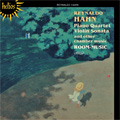 [from
CDA67391 – see review
by Ian Lace: ‘Enchanting, nostalgic music. Warm-hearted
performances by Room-Music with great sensitivity and lack of
condescension.’]
[from
CDA67391 – see review
by Ian Lace: ‘Enchanting, nostalgic music. Warm-hearted
performances by Room-Music with great sensitivity and lack of
condescension.’]
I played this just before Sunday lunch, a time to which the
music seems eminently suited. That’s not to downplay Hahn;
though I certainly wouldn’t make great claims for him –
there’s nothing like the intensity of Elgar’s chamber
music, for example – his work is extremely enjoyable and
these performances make a very strong case for him. With very
good recording, this certainly deserves a recommendation at
the new lower price.
Hyperion have already reissued Hahn’s mock-antique le
Bal de Béatrice d’Este on Helios CDH55167,
performed by the New London Orchestra/Ronald Corp and coupled
with Poulenc’s Aubade and Sinfonietta, another
highly desirable CD or download. You could build a decent music
library from these inexpensive Helios reissues alone –
one far better than could be had from the Ace of Clubs and Golden
Guineas of my youth and less than half the price in real terms.
Constant LAMBERT (1905-1951)
The Rio Grande, for chorus, alto solo, orchestra and
solo pianoforte (1927) [14:04]
Aubade héroïque, for small orchestra (1942)
[8:05]
Summer’s Last Will and Testament, for orchestra,
chorus and baritone solo (1936) [52:59]
Sally Burgess (mezzo); William Shimell (baritone); Jack Gibbons
(piano)
Chorus of Opera North/Martin Pickard; Leeds Festival Chorus/Simon
Wright
English Northern Philharmonia/David Lloyd-Jones – rec.
September 1991. DDD.
Pdf booklet with notes and texts included
HYPERION HELIOS CDH55388 [75:13] – from hyperion-records.co.uk
(mp3 and lossless)
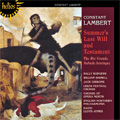 It’s
exactly 60 years since Constant Lambert died and about time
that his reputation received a boost – a task which this
Hyperion reissue is ideally placed to perform. The programme
begins with the well-known Rio Grande – perhaps
just lacking the last degree of oomph here – and progresses
to two lesser-known works, including Summer’s Last Will,
a setting of words by the Elizabethan Thomas Nash and a neglected
minor masterpiece. If a setting of a poem about the plague sounds
uninviting, think again. When this album was first released,
the recording was hailed as a supreme example of the Tonmeister’s
art and it still sounds very well. Snap it up.
It’s
exactly 60 years since Constant Lambert died and about time
that his reputation received a boost – a task which this
Hyperion reissue is ideally placed to perform. The programme
begins with the well-known Rio Grande – perhaps
just lacking the last degree of oomph here – and progresses
to two lesser-known works, including Summer’s Last Will,
a setting of words by the Elizabethan Thomas Nash and a neglected
minor masterpiece. If a setting of a poem about the plague sounds
uninviting, think again. When this album was first released,
the recording was hailed as a supreme example of the Tonmeister’s
art and it still sounds very well. Snap it up.
Don’t forget the Hyperion recording of Lambert’s Romeo
and Juliet, Piano Concerto and shorter works which I recommended
in the November
2010 Roundup (CDA67545).
Alternatively, there’s an equally fine version of Romeo
and Juliet on Lyrita SRCD.215, with Music for Orchestra
and ‘King Pest’ from Summer’s Last Will
– Recording of the Month: see review,
review
and review.
Try the latter from Spotify – free if you can stand the
ads – or download from amazon.co.uk;
don’t go for the emusic.com version – because of
the latter’s pay-per-track policy, it’s much more
expensive.
For a good third version of Romeo and Juliet, with Pomona
and the Overture The Bird Actors from the State Orchestra
of Victoria and John Lanchbery on Chandos CHAN9865, see
the 4-star review
and download in mp3 or lossless from theclassicalshop.net.
I can’t speak with any authority about RACHMANINOV’s
solo piano music, but those who can have praised Howard Shelley’s
1983 recording of the two sets of Études-tableaux,
Op.33 and Op.39 as exemplary: CDH55403 [57:03] here.
I may not be qualified to pronounce, but I greatly enjoyed hearing
this reissue. Don’t forget, however, that Hyperion have
already make Shelley’s complete Rachmaninov recordings
available at a special price: 8 CDs for £55.92 or download
in mp3 or lossless for £39.99, CDS44041/8 –
here.
***
Nicolas GOMBERT
(c.1495-c.1560)
Media vita in morte sumus [6:09]
Missa Media Vita: Kyrie [4:33]; Gloria [7:34]
Salve Regina [8:44]
Anima mea liquefacta est [6:56]
Missa Media Vita: Credo [10:15]
O Crux, splendidior [6:32]
Missa Media Vita: Sanctus [8:37]
Quam pulchra es [4:52]
Missa Media Vita: Agnus Dei [5:23]
Musæ Iovis [6:19]
The Hilliard Ensemble: (David James (counter-tenor); Rogers
Covey-Crump (tenor); Steven Harrold (tenor); Andreas Hirbreiter
(tenor); Gordon Jones (baritone); Robert Macdonald (bass)) –
rec. May 2002, Propstei St. Gerold. DDD.
No texts, but some notes available from ECM Records here.
ECM 1884 [76:00] – from emusic.com
(mp3)
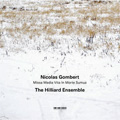 [see
appreciative review
by Dominy Clements]
[see
appreciative review
by Dominy Clements]
Only those irreconcilably opposed to 16th-century polyphony
or to the Hilliard Ensemble’s distinctive one-to-a-part
delivery should ignore this recording. For the rest of us, only
the lack of texts and translations is a real disadvantage –
and most of these are available online, especially the sections
of the Ordinary of the Mass, here with the cantus firmus
from Media vita, a funeral motet ditched at the Council
of Trent but the first part of which was employed as the opening
of the Anglican Burial Service:
Media vita in morte sumus; Quem quærimus adjutorem nisi
te, Domine, Qui pro peccatis nostris juste irasceris? Sancte
Deus, sancte fortis, Sancte misericors Salvator amaræ
morti ne tradas nos. In te speraverunt patres nostri; Speraverunt
et liberasti eos. Ad te clamaverunt patres nostri; Clamaverunt
et non sunt confuse. Gloria Patri, et Filio et Spiritui Sancto
In the midst of life we are in death: of whom may we seek for
succour, but of thee, O Lord, who for our sins art justly displeased?
Yet, O Lord God most holy, O Lord most mighty, O holy and most
merciful Saviour, deliver us not into the bitter pains of eternal
death. [Our fathers trusted in thee, they trusted and thou didst
deliver them. Our fathers cried to thee, they cried and were
not confounded. Glory be to the Father and to the Son and to
the Holy Spirit.]
The download does justice to the recording, with bit-rates around
256kb/s.
Gombert’s music has still not received the attention due.
For other recordings of it, please see:
– Magnificats: Gimell – Tallis Scholars (November
2008, Tallis
Scholars at 30)
– Tribulatio et angustia: Hyperion – Brabant
Ensemble – review
and review
– Missa octavi toni, Missa tempore paschali: Hyperion
Helios – Henry’s Eight (April 2011/1 and review:
Bargain of the Month)
– Magnificat I, etc. Naxos: Oxford Camerata –
see review:
download from classicsonline.com (mp3) – here.
Tomás Luis de VICTORIA (1548-1611)
Et Jesum: Motets for solo voice
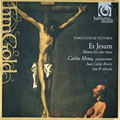 Et
Iesum [01:57]
Et
Iesum [01:57]
Duo Seraphim clamabant* [03:27]
O Decus Apostolicum [02:53]
Missa Quam pulchri sunt: Domine (vihuela solo) [01:14]
Senex puerum portabat [03:00]
Magi viderunt stellam [03:17]
Domine, non sum dignus [03:20]
Domine, non sum dignus (vihuela solo) [04:25]
O magnum mysterium [03:11]
Missa O magnum mysterium:
Sanctus* [01:55]
Benedictus* [01:51]
Agnus Dei* [01:34]
Ne timeas, Maria [03:38]
Missa Gaudeamus: Pleni sunt (lute solo) [01:29]
Iste Sanctus [02:09]
Estote fortes in bello* [02:32]
Alma redemptoris mater [05:55]
Missa Gaudeamus: Domine Deus (vihuela solo) [01:17]
O quam gloriosum [04:09]
Doctor bonus, amicus Dei [03:13]
Missa Quam pulchri sunt: Crucifixus (vihuela solo) [02:33]
Pueri Hebræorum [02:37]
Salve Regina [04:11]
Carlos Mena (alto); Francisco Rubio Gallego (cornet*); Juan
Carlos Rivera (lute, vihuela) – rec. October 2003. DDD
Texts not included.
HARMONIA MUNDI GOLD HMG50 7042 [65:48] – from classicsonline.com
(mp3)
[‘This is a fine recording which sheds light on a wide-spread
practice in the renaissance which hasn’t been given much
attention to.’ – see review
of earlier release by Johan van Veen]
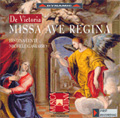 Missa
Ave Regina (8vv.) with propers for Mass of the Annunciation
of the BVM.
Missa
Ave Regina (8vv.) with propers for Mass of the Annunciation
of the BVM.
Antonio de CABEZÓN
Dic nobis Maria (organ) [1:10]
Tomás Luis de VICTORIA
Ave Regina Cœlorum for two choirs (8 voices) [3:13]
Antiphona: Vultum tuum (Gregorian chant) [2:49]
Kyrie (alternated with the Three Verses from the Missa
de N[uest]ra Señora by 17th-century Anonymous) [4:04]
Gloria [3:10]
Collecta: Dominus vobiscum … (Gregorian chant) [1:11]
Prophetia: Lectio Isaiæ prophetæ (Gregorian
chant) [1:09]
Canzon dopo l’Epistola : 17th-century Anonymous:
Partite sopra la Aria della Folia España (organ)
[3:16]
Alleluia (Gregorian chant) [2:00]
Evangelium: Dominus vobiscum (Gregorian chant) [2:29]
Credo (choir) [5:59]
Ad Offertorium: Ave maria, gratia plena (choir) [3:36]
Præfatio: Per omnia sæcula sæculorum (Gregorian
chant) [2:43]
Sanctus (choir) [3:01]
Ad Elevationem: Pablo BRUNA
Tiento de falsas (organ) [4:53]
Per omnia sæcula sæculorum (Gregorian chant)
[1:51]
Agnus Dei (choir/ Gregorian chant/ choir) [2:55]
Ad Communionem: Lucas PUXOL
Obra de 6° tom (organ) [2:56]
Domine non sum dignus (choir) [2:40]
Postcommunio: Oremus … (Gregorian chant) [0:55]
Dominus vobiscum … Ite missa est (Gregorian chant)
[0:37]
Ad Finem: Ave Regina Cœlorum (choir) [3:56]
Sancta maria, succurre miseris (choir and viola da gamba)
[3:03]
Francisco Correa de ARAUXO Canto
Ilano de la Inmaculada Concepción De la Virgen Maria
(organ) [1:22]
Festina Lente/Michel Gasbarro – rec c.2000? DDD.
Pdf booklet with texts included – but no translations
DYNAMIC CDS261 [65:10] – from classicsonline.com
(mp3)
Tomás Luis de VICTORIA
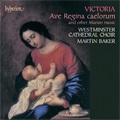 Ave
Regina cælorum for eight voices [4:34]
Ave
Regina cælorum for eight voices [4:34]
Missa Ave Regina cælorum for eight voices [19:56]
Ave Maria for four voices [2:08]
Dixit Dominus for eight voices [5:37]
Laudate pueri Dominum for eight voices [5:05]
Laudate Dominum omnes gentes for eight voices [3:19]
Lætatus sum for twelve voices [6:56]
Nisi Dominus for eight voices [5:22]
Magnificat septimi toni for four voices [10:09]
Ave Maria for eight voices [4:15]
The Choir of Westminster Cathedral/Martin Baker – rec.
February 2004. DDD
Pdf booklet with texts and translations included.
HYPERION CDA67479 [67:02] – from hyperion-records.co.uk
(mp3 and lossless)
Tomás Luis de VICTORIA
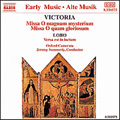 Ave
Maria [1:37]
Ave
Maria [1:37]
Missa O magnum mysterium [17:28]
O magnum mysterium [4:25]
Missa O quam gloriosum [20:01]
O quam gloriosum [2:12]
Ardens est cor meum [5:00]
Alonso LOBO (c.1555-1617) Versa
est in luctum [5:15]
Oxford Camerata/Jeremy Summerly – rec. April 1992. DDD
NAXOS 8.550575 [57:26] – from classicsonline.com
(mp3)
The wide-spread practice to which JV refers in his review of
the Harmonia Mundi recording was to reduce Victoria’s
elaborate polyphony to solo voice plus instrument(s) in churches
and even cathedrals which didn’t have the resources for
the full works. (See the Chandos recording below for a similar
practice of setting of Vespers for one or two soloists and small
ensemble.) Et Jesum had passed me by until I heard
some of the tracks on BBC Radio 3 and immediately requested
a review download from classicsonline.com. It’s a wonderful
set of performances, sounding well in mp3. Only the lack of
texts, some of which are not easy to come by, makes me recommend
the CD in preference – at HM Gold’s mid price it’s
not much more expensive than the download.
The Dynamic recording attempts to reconstruct the Mass
of the Annunciation as it might have been performed with chant
and items from the works of Victoria’s contemporaries.
We know that his music was performed in the manner demonstrated
by the Harmonia Mundi recording; the Dynamic reflects only a
possibility, but it’s an interesting reconstruction in
the manner which we associate with Paul McCreesh. Having had
some less than ideal experiences of Spanish singing of renaissance
polyphony, I was pleasantly surprised to discover some very
competent performances here from what appears to be an Italo-Spanish
collaboration. I still prefer UK-based choirs, especially that
of Westminster Cathedral, in this repertoire, together with
professional groups such as The Sixteen and the Tallis Scholars,
but Festina Lente may well come closer to the sound that Victoria
would have heard. The recording reproduces well and the booklet
is informative.
Though hailed as a first recording on the cover, the Dynamic
recording has the field to itself only in the sense that it’s
coupled with the propers of the Annunciation. Hyperion offer
the settings of the Motet and Mass without the propers but with
other works by Victoria on CDA67479. Need I add that
the performances are excellent, that the presentation is well
up to Hyperion’s high standards and that the recording
comes in flac and alac as well as mp3, all for the same price.
As the price happens to be identical to that of the Dynamic
recording from classicsonline.com, that just puts the Hyperion
recording ahead.
The CD of the Naxos recording has been in my own collection
for a long time. Can it really be nearly 20 years ago? It sounds
very well in mp3, though keener, younger ears may just be able
to sport the difference. The fairly brisk, small-scale performances
are excellent and the download comes complete with the Naxos
booklet, albeit that there are no texts. This is the least expensive
download of Victoria’s music on the market – further
reduced from £4.99 to £3.74 at the time of writing
– but that doesn’t mean cut-price singing, far from
it.
In an alternative coupling on 8.553240
the same performance of the Missa O magnum mysterium
is accompanied by Masses from Alonso and Duarte Lobo and
Lassus – at 64 minutes, that’s better value, but
I prefer the coupling of the two Victoria Masses.
Chamber Vespers: Miniature Masterpieces of the Italian Baroque
Orazio TARDITI (1602 – 1677)
Domine ad adiuvandum (1650) [2:20]
Adriano BANCHIERI (1568 –
1634) Psalm I. Dixit Dominus (1613) [4:51]
Giovanni Paolo CIMA (c. 1570
– 1630) Sonata per cornetto (1610) [3:55]
Giacomo FINETTI (fl. 1605 –
1631) Psalm II. Laudate pueri (1613)* [5:20]
Alessandro PICCININI (1566 –
c. 1638) Toccata quarta (1623) [1:26]
Francesco PETROBELLI (d. 1695)
Psalm III. Lætatus sum (1670)* [9:25]
Girolamo Alessandro FRESCOBALDI (1583
– 1643) Canzon terza per basso solo (1634)
[3:33]
Orazio TARDITI Psalm IV.
Nisi Dominus (1650)* [4:45]
Girolamo Alessandro FRESCOBALDI Capriccio
sopra un soggetto (1626) [4:48]
Natale MONFERRATO (c. 1615 –
1685) Psalm V. Lauda Jerusalem (MS, not dated)* [6:10]
Archangelo CROTTI (fl. 1608)
[Sonata sopra] Sancta Maria (1608) [2:06]
Giovanni Felice SANCES (c. 1600
– 1679) Hymn. Ave, maris stella (1638) [3:13]
Adriano BANCHIERI Canticle.
Magnificat (1613)* [5:08]
Maurizio CAZZATI (1616 –
1678) Regina cæli (1667)* [4:05]
The Gonzaga Band: (Faye Newton (soprano); Jamie Savan (treble
cornett, mute cornett); Richard Sweeney (theorbo); Steven Devine
harpsichord (chamber organ))with Clare Wilkinson (mezzo); Gawain
Glenton (treble cornett, mute cornett)
Project director Jamie Savan – rec. August 2010. DDD
Pitch: A = 440 Hz; Temperament: quarter comma mean tone
* premiere recordings
Pdf booklet included with texts and translations
CHANDOS CHACONNE CHAN0782 [62:16] – from theclassicalshop.net
(mp3, 16- and 24-bit lossless)
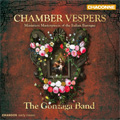 Monteverdi’s
Vespers of 1610 would have been beyond the resources of even
comparatively large churches and cathedrals in the early 17th
century. Without suggesting that any establishment ever rounded
off their major Sunday or Saint’s Day services with this
collection, Chandos has assembled the kind of smaller-scale
setting of the Versicles, Responses, psalms, Magnificat,
hymns and motets, with at most two solo voices, which could
have been employed at any time in the first three quarters of
that century. To do so, they’ve raided the works of the
great and well-known and included quite a few unknowns –
note the number of premiere recordings.
Monteverdi’s
Vespers of 1610 would have been beyond the resources of even
comparatively large churches and cathedrals in the early 17th
century. Without suggesting that any establishment ever rounded
off their major Sunday or Saint’s Day services with this
collection, Chandos has assembled the kind of smaller-scale
setting of the Versicles, Responses, psalms, Magnificat,
hymns and motets, with at most two solo voices, which could
have been employed at any time in the first three quarters of
that century. To do so, they’ve raided the works of the
great and well-known and included quite a few unknowns –
note the number of premiere recordings.
It’s all much less exciting than the Monteverdi collection,
of course, but it’s deeply satisfying – more intimate
and, in many ways, more spiritual. Modern copies of original
instruments are employed, tuned in pre-equal-tone manner, but
I doubt if many congregations in the seventeenth century heard
performances as good as these: full marks all round, except
to whoever typed the Notes on the web page for spelling Divine
Vespers as Devine Vespers, a howler not at all
like Chandos and not perpetuated in the same paragaph in the
booklet, I’m pleased to say. The same errant spelling crops
up again in Chandos’ ads in the magazines – surely
it can’t be intended as a pun on the name of Steven Devine;
if it is, he doesn’t perpetuate it on his own website,
where he correctly refers to Divine Vespers.
Luigi CHERUBINI (1760-1842)
Marche funèbre (1820) [6:10]
Requiem in c minor (1816) [47:06]
Corydon Singers; Corydon Orchestra/Matthew Best – rec.
April 1995. DDD
Pdf booklet included with texts and translations.
HYPERION CDA66805 [53:32] – from hyperion-records.co.uk
(mp3 and lossless)
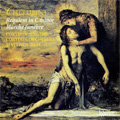 If
you heard the Mozart and Verdi Requiems at the BBC Proms
this year and were thinking of what to try next, the Cherubini,
a work praised by Beethoven, Berlioz and Brahms, is an obvious
choice and this Hyperion performance is the only download version
that I know that’s available in lossless sound. The excellent
performances stress Cherubini’s kinship with Beethoven,
who reportedly said that if he wrote a Requiem he would
want it to sound like this, and there’s a price reduction
from the normal £7.99 to £6.99 in all formats to
take account of the slightly short playing time.
If
you heard the Mozart and Verdi Requiems at the BBC Proms
this year and were thinking of what to try next, the Cherubini,
a work praised by Beethoven, Berlioz and Brahms, is an obvious
choice and this Hyperion performance is the only download version
that I know that’s available in lossless sound. The excellent
performances stress Cherubini’s kinship with Beethoven,
who reportedly said that if he wrote a Requiem he would
want it to sound like this, and there’s a price reduction
from the normal £7.99 to £6.99 in all formats to
take account of the slightly short playing time.
If you’re looking for extra value, don’t mind mp3,
and you still haven’t got a version of the Verdi
Requiem, amazon.co.uk have Muti’s 2-CD budget set
of the two works for £5.99: preview in Spotify.
Henryk WIENIAWSKI (1835-1880)
Violin Concerto No. 1 in f sharp minor, Op. 14 [27:28]
Violin Concerto No. 2 in d minor, Op. 22 [23:49]
Légende, for violin and orchestra in g minor,
Op. 17 [7:33]
Pablo SARASATE (1844-1908)
Zigeunerweisen, for violin and orchestra (‘Gypsy
Airs), Op. 20 [8:59]
Gil Shaham (violin); London Symphony Orchestra/Lawrence Foster
– rec. 1990. DDD.
DEUTSCHE GRAMMOPHON 431 8152 [68:04] – from passionato.com
(mp3)
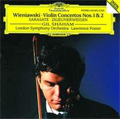 Last
month in a tailpiece I welcomed Charlie Siem’s new recording
of the Bruch Violin Concerto, with the Wieniawski Violin Concerto
No.1 (Warner 2564 6661-2), though only as an all-concertante
alternative to the Gluzman/Litton all-Bruch recording (BIS-SACD-1852).
Those who choose the BIS Bruch and/or prefer both Wienawski
concertos together might well wish to consider this alternative
from Gil Shaham, with the Légende and Sarasate’s
Zigeunerweisen as attractive couplings. These are the
kinds of glorious performance that make good second-rate music
sound first-rate. Try them first from Spotify.
Last
month in a tailpiece I welcomed Charlie Siem’s new recording
of the Bruch Violin Concerto, with the Wieniawski Violin Concerto
No.1 (Warner 2564 6661-2), though only as an all-concertante
alternative to the Gluzman/Litton all-Bruch recording (BIS-SACD-1852).
Those who choose the BIS Bruch and/or prefer both Wienawski
concertos together might well wish to consider this alternative
from Gil Shaham, with the Légende and Sarasate’s
Zigeunerweisen as attractive couplings. These are the
kinds of glorious performance that make good second-rate music
sound first-rate. Try them first from Spotify.
If you prefer a fellow Pole in Wieniawski, there’s a recording
of the two Violin Concertos alone on the Dux label, with Mariusz
Patyra as soloist (DUX0674), about which my only serious
reservation is that it’s rather short on playing time.
Bela BARTÓK (1881-1945)
Violin Concerto No. 1, BB48a, Sz.36 (1907/8) [20:45]
Violin Concerto No. 2, BB117, Sz.112 (1938) [36:01]
Viola Concerto BB 128, Sz.120 (1945, cptd. Tibor SERLY,
1949) [20:40]
James Ehnes (violin/viola)
BBC Philharmonic/Gianandrea Noseda – rec. November 2009
and November 2010. DDD.
Pdf booklet available
CHANDOS CHAN10690 [77:15] – from theclassicalshop.net
(mp3, 16- and 24-bit lossless)
[See Seen and Heard reviews of Ehnes, BBC Philharmonic and Noseda
in this repertoire:
Violin Concerto 1, 30.10.2010: Michael Cookson here;
Viola Concerto, 26.02.2011: Michael Cookson here.]
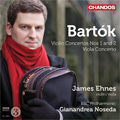 Those
looking for value for money will not be disappointed by this
very full programme – not just the two violin works but
the Viola Concerto as well. Even if you choose the 24-bit download
at £15.99, that’s still plenty of music for your
outlay. mp3 and 16-bit come at £7.99 and £9.99 respectively,
which compares very favourably price-wise even with the well-liked
budget-price Naxos version of just the two Violin Concertos
(György Pauk; Polish National Radio Symphony Orchestra/Antoni
Wit, 8.554321 – download in mp3 only from classicsonline.com).
the EMI Zimmermann/Shallon coupling of the Bartók Viola
Concerto and Hindemith’s Der Schwanendrehrer –
available to stream from the Naxos Music Library – is
made to look very poor value by comparison, at just 49 minutes.
Those
looking for value for money will not be disappointed by this
very full programme – not just the two violin works but
the Viola Concerto as well. Even if you choose the 24-bit download
at £15.99, that’s still plenty of music for your
outlay. mp3 and 16-bit come at £7.99 and £9.99 respectively,
which compares very favourably price-wise even with the well-liked
budget-price Naxos version of just the two Violin Concertos
(György Pauk; Polish National Radio Symphony Orchestra/Antoni
Wit, 8.554321 – download in mp3 only from classicsonline.com).
the EMI Zimmermann/Shallon coupling of the Bartók Viola
Concerto and Hindemith’s Der Schwanendrehrer –
available to stream from the Naxos Music Library – is
made to look very poor value by comparison, at just 49 minutes.
James Ehnes and Gianandrea Noseda have performed all three of
these works in public, with the BBC Phil, as listed above, and
the Second Violin Concerto with the LSO at the Barbican in October
2010. All the reviews that I’ve seen of those performances
stress Ehnes’s almost effortless virtuosity – a necessary
quality, of course, but is it enough to live up to Chandos’
billing of Recording of the Month when there are some excellent
alternatives in the lower price categories? As well as the Naxos
recording mentioned above, amazon.co.uk have the Menuhin/Doráti
2-CD set of the three concertos plus Rhapsodies 1 and 2, the
six Duos, etc. for £5.99 – here
– which John Leeman described as an irresistible bargain
– see review.
(EMI Gemini 5854872). Despite some less than secure playing
occasionally, Menuhin’s and Doráti’s special
relationship with Bartók inclines me still to regard
these performances as my benchmark.
Apart from the opening movement of the first Violin Concerto,
where Ehnes and Noseda adopt an andante which is more
sostenuto, the Chandos performers adopt faster tempi
than their older rivals – sometimes considerably faster,
as in the second movement of the same concerto 11:15 against
12:57. Hearing the two performances one after the other –
not always a good idea because it over-emphasises differences
– I did think the new version dragged very slightly in
the first movement but never to the extent that it sounded laboured.
By way of compensation the accompaniment sounds more powerful,
aided by the recording. In the second movement the faster tempo
of the new recording works very well – here it’s
Menuhin who very slightly allows the music to drag.
It’s the second Violin Concerto, for long the only one
known, that will interest most listeners. Here the new recording
is faster throughout than Menuhin (1965) – himself a few
seconds slower in each movement than he had been in 1947 –
with Pauk (Naxos) noticeably slowest of all in the opening movement
and very close to Menuhin in the other two movements. Ehnes
and Noseda take the first movement almost two minutes faster
than Menuhin (1965) and a full two minutes faster than Pauk,
largely because Ehnes makes some difficult music sound easy.
I never felt, however, that that this was virtuosity for its
own sake – indeed, there’s a great deal of tenderness
as well as fire in this interpretation. Menuhin (1947) almost
exactly splits the difference between Ehnes and his own later
timing here.
Putting aside comparisons, I very much enjoyed the new recording
of the Second Concerto – just as much as I enjoyed making
the acquaintance of Menuhin again, whose recording of this concerto
and the Six Duos I owned on LP.
In the Viola Concerto Ehnes and Menuhin are much closer in tempo.
Both are a little faster in the opening movement than Yuri Bashmet
and Pierre Boulez, with whom they are in close agreement in
the other movements (DG 477 7440, with Violin Concerto
No.1 and the Concerto for 2 pianos, percussion and orchestra
– a ‘top notch release’: see review
by Dominy Clements – download from passionato.com).
In an interesting interview on BBC Radio 3 CD Review, Noseda
spoke of Ehnes as a soloist who really believes in this work
and that comes through well in the recording.
The Chandos 24-bit recording is (very) good but not exceptional.
Unless your system can make full use of 24/96 quality –
Squeezebox, for example, downsizes 24/96 to 24/44 – I’d
go for the ‘ordinary’ 16-bit CD-quality. Most of the
tracks of the amazon mp3 download of the much older Menuhin
are at slightly less than their usual 256kb/s so, on the face
of it, comparisons should be odious, but in practice the latter
is much more than acceptable – it’s certainly not
shamed by the comparison.
It’s swings and roundabouts, then. Personal choice and
price may well be your deciding factors. You can hear the new
recording from Naxos Music Library and the Menuhin from Spotify,
who also have his Mercury recording of Violin Concerto No.2,
again with Doráti.
Sir Michael TIPPETT (1905-1998)
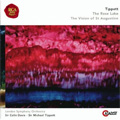 The
Rose Lake, a song without words for orchestra (1991-95) [30:02]
The
Rose Lake, a song without words for orchestra (1991-95) [30:02]
The Vision of St. Augustine (1965) [38:15]
John Shirley-Quirk (baritone)
London Symphony Orchestra and Chorus/Sir Colin Davis (Rose Lake);
Sir Michael Tippett (Vision)
rec. Walthamstow Town Hall, 17 April 1997 (Rose Lake) and 7-8
June 1971 (Vision) DDD
BMG-RCA CATALYST 8287664284 2 [68:19] – from amazon.co.uk
(mp3)
[‘Whatever your thoughts about the coupling, The Rose Lake
demands your attention.’ – see full review
by Tony Haywood.]
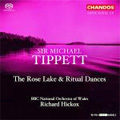 The
Rose Lake, a song without words for orchestra (1991-95) [29:09]
The
Rose Lake, a song without words for orchestra (1991-95) [29:09]
Ritual Dances for orchestra (1953) from The Midsummer Marriage
(1946-52) [24:22]
BBC National Orchestra of Wales/Richard Hickox – rec.
November 2004 and July 2005. DDD/DSD
Pdf booklet included.
CHANDOS CHAN/CHSA5039 [53:39] – from theclassicalshop.net
(mp3 and lossless)
I first heard the Vision at the 2005 Proms and didn’t
know whether to agree with those whose response was to be grateful
that they had heard it once or with those who thought it a neglected
masterpiece. Hearing it again now, I’m still not sure,
for all that I’m interested in Augustine’s struggle
to shape a coherent set of beliefs and particularly in his Confessions,
which form the basis of Tippett’s music. The trouble is
that I’m not sure that Tippett knew what he was aiming
to do.
The Rose Lake is another matter – his last work
and a beautiful and appropriate farewell it is. Both pieces
are well performed on RCA and the recording is good throughout
– even the 1971 recording comes up well, though the bit-rate
is disappointingly slightly below Amazon’s normal 256kb/s.
Amazon’s attractive download price of £4.99 is (surprisingly)
matched by the same asking price for the CD, including delivery,
from the same suppliers. In view of the low-ish bit-rate of
the download and the lack of notes in that form, you may well
prefer to go for the CD.
The Chandos coupling may appeal to more listeners, especially
those who don’t already have the Ritual Dances. It also
comes with a booklet of notes. If, at first, The Rose Lake
appears slightly less magical on this recording, where some
of the sections are taken a little faster, the difference is
minimal: overall, this recording is not far behind at all. This
recording of the Ritual Dances as a concert piece is preferable
to taking them from a complete recording of the Midsummer
Marriage – a work which I must admit that I’ve
never come to terms with, much as I like the Dances. Excellent
recording – only the surround channels are missing from
the lossless download.
Olivier MESSIAEN (1908-1992)
La Nativité du Seigneur, 9 méditations pour
orgue (1935)
Hans-Ola Ericsson (1987 Grønlund Organ of Luleå
Cathedral) – rec.1988. DDD.
Pdf booklet included
BIS-CD-410 [61:13] – from eclassical.com
(mp3 and lossless)
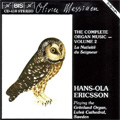 This
is volume 2 of the BIS Complete Organ Music of Messiaen, well
worth considering on its own for those who don’t want the
whole set, though that’s excellent value at 7 CDs for the
price of 3 (BIS-CD-1770-72, see review
by Dominy Clements). The complete set is better value, but the
eclassical.com price of $7.21 compares well with £7.99
for mp3 from classicsonline.com.* See below for availability
of Gillian Weir’s Priory recording.
This
is volume 2 of the BIS Complete Organ Music of Messiaen, well
worth considering on its own for those who don’t want the
whole set, though that’s excellent value at 7 CDs for the
price of 3 (BIS-CD-1770-72, see review
by Dominy Clements). The complete set is better value, but the
eclassical.com price of $7.21 compares well with £7.99
for mp3 from classicsonline.com.* See below for availability
of Gillian Weir’s Priory recording.
My initial feeling was that Ericsson’s interpretation was
a mite lacking in power and emotion by comparison with Jennifer
Bate, formerly on Unicorn-Kanchana, now boxed at budget price
on Regis, but I soon found myself agreeing with so much of what
Dominy Clements had to say that I’m simply going to quote
his review:
Ericsson’s performance is one of the utmost clarity, and
one has the feeling that there is nothing imposing itself between
the music and its message. All of the hushed reverence is present,
as well as the more turbulent stresses in Le Verbe and
Les Anges. The voice of doom in the bass lines when Jésus
accepte la Souffrance is more of a mildly gruff uncle, where
Bate’s is the voice of your most feared schoolteacher.
Latry’s pedal here is more that of a throaty pharmacist
offering soothing lozenges than anything really threatening.
Where he wins is in the final Dieu parmi nous, whose
descending bass lines can really rattle your tonsillectomy scars.
Bate is also good here, with plenty of atmosphere, but almost
engulfed in resonance. Ericsson takes a swifter, more dramatic
tempo in the opening chords, but sustains more later on. I feel
the organ and the engineer’s treatment of the acoustic
might possibly have conjured a final nth more of atmospheric
potential in the gentler sections, but what you do get is a
true sense of what Messiaen actually wrote, rather than anything
that the environment may or may not have dictated.
* classicsonline.com don’t seem to realise that this is
a 7-for-3 complete set, so their asking price of £55.93
is uncompetitive with the CD set, typically on sale for around
£38.
Dan Morgan has also been listening to this download:
Having recently immersed myself in this work as part of a review
for the main site I thought this would be a good opportunity
to try the download of Hans-Ola Ericsson’s La Nativité.
Volume 2 in the BIS series, it’s played on the Grönlund
organ (1983-1987) of Luleå Cathedral in Sweden. As a performance
it faces tough competition from Simon Preston (Decca), Gillian
Weir (Collins/Priory) and, most recently, Jean-Pierre Lecaudey
(Pavane). I daresay these CDs can be downloaded from the internet*;
if not, I’m sure most collectors are happy to supplement
their virtual collections with discs where necessary. I’ve
chosen to review the 16-bit flac version.
Messiaen’s epic, nine-movement meditation on the birth
of Christ must be one of the pinnacles of 20th-century organ
music, a densely woven tapestry laced with threads of silver
and gold. This emphasis on colour – combined with breathtaking
scale – makes the choice of instrument more important
than ever; the organs of Aarhus Cathedral (Weir) and Westminster
Abbey (Preston) manage to convey both the subtlety and scale
of the piece. By contrast the quieter Grönlund speaks in
cool, clear tones, ‘La Vierge et l’Enfant’ beautifully
detailed but much less radiant than Preston, who is simply unassailable
here and in the rarefied music of ‘Les Bergers’. That
said, the BIS team capture the high-lying notes of the latter
most beautifully.
Whatever one’s view of Messiaen’s very personal universe,
few organists bring out the profound sense of rapture that pervades
this great work. For all his clarity – perhaps even because
of it – Ericsson seems a tad prosaic at times; the static
nature of ‘Desseins éternels’ shouldn’t
preclude a deep sense of communion, and while I prefer Preston
and Lecaudey at this point Ericsson is very persuasive indeed.
The requisite glow is there, but rivals – Preston especially
– conjure up huge sculptures in sound, startling in their
palpability and presence. Perhaps it helps to have an intuitive
‘connection’ with this score, but a spacious acoustic
certainly enhances the illusion.
The magisterial music of ‘Le Verbe’ is splendid though,
the dark pedals beautifully contrasted with the ecstasy and
shimmer from above. Pleasing as he is, Ericsson just lacks that
extra dimension – the penetrating gaze, if you will –
that distinguishes great Messiaen playing from the merely serviceable.
In any event, this movement lacks essential mystery, and while
the BIS team have done a fine job the Decca recording –
which dates from 1965 – is a wonder to behold. But it’s
not just about profundity, for the sheer, inexorable surge and
spike of this piece needs to be conveyed as well; in that respect
Ericsson is outclassed by his peers.
Perhaps this lack of dynamism and contrast explains, to some
extent at least, why this performance leaves me feeling curiously
detached. And while the weight and wash of ‘Les Enfants
de Dieu’ is impressive there’s no big, rolling bass
to underpin this music. That said, this is a recording from
the early days of digital, and in that context it’s pretty
good. Thankfully there’s no glare or hint of digital ‘edge’
in the shimmering haloes of ‘Les Anges’, but listeners
hoping for any insights or epiphanies will be sorely disappointed.
The dark, excoriating textures of ‘Jésus accepte
la souffrance’ are superbly realised in the Weir, Preston
and Lecaudey recordings; it’s much less visceral here.
Indeed, one might even be tempted to characterise this as a
lightweight performance that, despite external charms, simply
doesn’t dig deep enough. So although the rise and fall
of ‘Les Mages’ is adroitly done, Preston et al find
a transfiguring beauty in these notes that simply eludes the
Swede. As for ‘Dieu parmi nous’ it really ought to
be a grand summation of all that’s gone before; the Swedish
organ makes a mighty noise at the outset, but there’s little
here to batter the heart or liberate the soul.
Unfortunately for Ericsson he’s up against formidable competition
in a very small, specialised field. Make no mistake, this is
a perfectly decent performance; it’s just not a memorable
one.
Dan Morgan
* In fact there are surprisingly few good versions available
to download: passionato.com have Olivier Latry (DG); amazon.co.uk
and emusic.com have Jennifer Bate (Jade); classicsonline.com
have the BIS recording reviewed above and Tim Byram-Wigfield
(2 CDs, Delphian, with l’Ascension and Messe
de la Pentecôte). Best of all, theclassicalshop.net
has Gillian Weir, just £4.99 in mp3 or £7.99 in
lossless, coupled with Apparition de l’Église
éternelle and le Banquet céleste (Priory)
– the same recording in mp3 only costs £7.99 from
iTunes. Amazon.co.uk have Simon Preston’s la Nativité
as part of a 7-CD set of Messiaen Piano and Organ Music for
£27.99.
Olivier MESSIAEN (1908-1992)
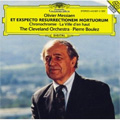 Chronochromie,
for orchestra, I/43 [23:47]
Chronochromie,
for orchestra, I/43 [23:47]
La Ville d’en haut, for 31 winds, piano & percussion,
I/56 [9:17]
Et exspecto resurrectionem mortuorum, for 34 winds &
3 percussion, I/47 [24:31]
Cleveland Orchestra/Pierre Boulez – rec. March 1993. DDD
DEUTSCHE GRAMMOPHON 445 8272 [57:48] – from passionato.com
(mp3)
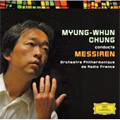 Trois
petites liturgies de la présence divine (1944) [34:04]
Trois
petites liturgies de la présence divine (1944) [34:04]
Couleurs de la cité céleste (1964) [17:24]
Hymne pour grand orchestre (1932 ) [16:44]
Roger Muraro (piano); Valérie Hartmann-Claverie (ondes-martenot);
Hélène Collerette (violin); Catharine Cournot
(piano)
Maîtrise de Radio France/Morgan Jourdain
Orchestre Philharmonique de Radio France/Myung-Whun Chung –
rec. 2007? DDD.
DEUTSCHE GRAMMOPHON 477 7944 [68:14] – from passionato.com
(mp3)
I’ve neglected Messiaen for some time, but the BIS recording
of la Nativité made me look around for some back-catalogue
recommendations. I got to know Et exspecto resurrectionem
and Couleurs de la cite céleste from an old CBS
recording with Pierre Boulez (SBRG72471/Columbia MS7356)
and his more recent version of the former makes an excellent
replacement, perhaps a little more detached and cerebral, but
better recorded, even in mp3. Considering that the Cleveland
Orchestra can’t have been very familiar with Messiaen,
this recording marked a major achievement. Boulez is, of course,
a major Messiaen interpreter whose own music is influenced by
Messiaen – so why does Messiaen’s work satisfy me
and most of Boulez’s drive me mad?
Anne Ozorio welcomed the Myung-Whun Chung recording on
CD – see review
– and the download is equally recommendable. I didn’t
know the Liturgies; though I reckon that I could easily
have recognised them as Messiaen, there are some surprises here,
with gamelan influence anticipating Britten’s Prince
of the Pagodas and syncopations which at times predate Bernstein’s
Chichester Psalms. It’s by far the longest work
in the programme and it doesn’t outstay its welcome in
this performance, though I still think Couleurs de la cité
céleste the masterpiece here, in a performance (almost)
to equal the old Boulez CBS recording from which I got to know
the work, and far better recorded. There’s no lossless
version, but the mp3 is pretty good.
First
Hearings
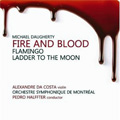 Two
new albums have reached me via Warner Classics and Jazz Play
MPE Player. Both sound very well in that format and should sound
equally well when released as mp3 downloads. Michael
DAUGHERTY’s (b.1954) Fire and Blood (2003),
Flamingo and Ladder to the Moon, a 60-minute programme
performed by Alexandre da Costa (violin) with the Montréal
Symphony Orchestra and Pedro Halffter will be available to download
from
amazon.co.uk on September 3rd. (2564 71947 [60:34]).
You’ll find some information on Michael Daugherty in Carla
Rees’s review
of a Naxos recording of Fire and Blood. If you’re
not sure whether you’ll like Fire and Blood, try
it on YouTube – here.
Suffice it to say that I enjoyed the new recording and that
I haven’t heard the Naxos version, which is rather less
expensive.
Two
new albums have reached me via Warner Classics and Jazz Play
MPE Player. Both sound very well in that format and should sound
equally well when released as mp3 downloads. Michael
DAUGHERTY’s (b.1954) Fire and Blood (2003),
Flamingo and Ladder to the Moon, a 60-minute programme
performed by Alexandre da Costa (violin) with the Montréal
Symphony Orchestra and Pedro Halffter will be available to download
from
amazon.co.uk on September 3rd. (2564 71947 [60:34]).
You’ll find some information on Michael Daugherty in Carla
Rees’s review
of a Naxos recording of Fire and Blood. If you’re
not sure whether you’ll like Fire and Blood, try
it on YouTube – here.
Suffice it to say that I enjoyed the new recording and that
I haven’t heard the Naxos version, which is rather less
expensive.
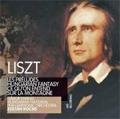 Gábor
Farkas (piano) has already made something of a reputation as
an interpreter of Ferencz LISZT with
a recital entitled An Evening with Liszt: Michael Cookson
was particularly impressed with his rendition of the b minor
Sonata (Warner 2564 69847 – see review).
On a new 59-minute release (2564 67226) he joins the
Hungarian National Philharmonic Orchestra and Zoltan Kocsis
in live performances of Les Preludes, the Hungarian
Fantasy and Ce qu’on entend sur la Montagne,
due for release on September 5th. The performances are very
dramatic, especially so in the case of the Hungarian Fantasy
– after all, it’s even more of a warhorse than the
piano concertos, with which I’m surprised that it isn’t
more often coupled, so it’s legitimate to pile the drama
on. The live recording is vivid, with the piano and the cellos
and basses clearly pinpointed antiphonally, almost in the manner
of early stereo demo discs. This is one to sample first.
Gábor
Farkas (piano) has already made something of a reputation as
an interpreter of Ferencz LISZT with
a recital entitled An Evening with Liszt: Michael Cookson
was particularly impressed with his rendition of the b minor
Sonata (Warner 2564 69847 – see review).
On a new 59-minute release (2564 67226) he joins the
Hungarian National Philharmonic Orchestra and Zoltan Kocsis
in live performances of Les Preludes, the Hungarian
Fantasy and Ce qu’on entend sur la Montagne,
due for release on September 5th. The performances are very
dramatic, especially so in the case of the Hungarian Fantasy
– after all, it’s even more of a warhorse than the
piano concertos, with which I’m surprised that it isn’t
more often coupled, so it’s legitimate to pile the drama
on. The live recording is vivid, with the piano and the cellos
and basses clearly pinpointed antiphonally, almost in the manner
of early stereo demo discs. This is one to sample first.
Phantasm: Music for Saxophone
Ed MARTIN Apparitions [3:35]
Zachary CROCKETT Fight to
Flow Between [7:19]
Karlheinz ESSL Sequitur
VII [6:31]
Eric HONOUR Phantasm [8:00]
Edward D DAVIS sugar baby
[6:50]
William COOGAN Fantasy [5:18]
Christopher BIGGS Exterminate
all the Brutes [9:29]
Lou BUNK Luna [8:46]
Massimo BIASONI Il Cortile
di Charlie [12:13]
Scott McLAUGHLIN Whitewater
[7:56]
Luigi CECCARELLI Neuromante
[13:06]
Eric Honour (clarinet and computer electronics) – rec?
DDD.
RAVELLO RR7815 [79:03] – from classicsonline.com
(mp3)
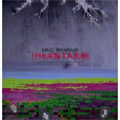 I’ll
get my grumble in first. The download comes without notes, just
the back cover, which is a serious omission in view of the likelihood
that most listeners, especially on the UK side of the pond,
are not likely to know much about any of these contemporary
composers – this could have been my own Discovery of the
Month – and the music won’t be to all tastes. Nor
was there anything on the Ravello Records website – at
the end of August, Phantasm was still announced as coming
soon in July!
I’ll
get my grumble in first. The download comes without notes, just
the back cover, which is a serious omission in view of the likelihood
that most listeners, especially on the UK side of the pond,
are not likely to know much about any of these contemporary
composers – this could have been my own Discovery of the
Month – and the music won’t be to all tastes. Nor
was there anything on the Ravello Records website – at
the end of August, Phantasm was still announced as coming
soon in July!
Eric Honour’s own site
is a little more forthcoming: ‘In May 2008, Honour put
out an international call for scores for saxophone and computer.
After receiving more than 30 submissions from North and South
America, Europe, Oceania, and the Middle East, he chose 11 extraordinary
works.’ You’ll also find some excerpts from the music
there and a video of Honour performing Sequitur VII.
I must confess to being no great fan of the experimental and
avant-garde but there was enough here to grab my interest, not
least Honour’s own work (track 4) which gives its name
to the album. The following track, sugar babe, sax with
banjo-simulation, is perhaps the most immediately appealing.
As it’s all performed by its begetter, who is also an audio
engineer, these must count as definitive performances. At the
very reasonable price of $7.99/£4.99 from classicsonline.com
– less expensive than the iTunes equivalents – you
can afford to experiment with Ravello and Navona recordings.
Alternatively, try this out at that valuable resource, the Naxos
Music Library.




 All Nimbus reviews
All Nimbus reviews








